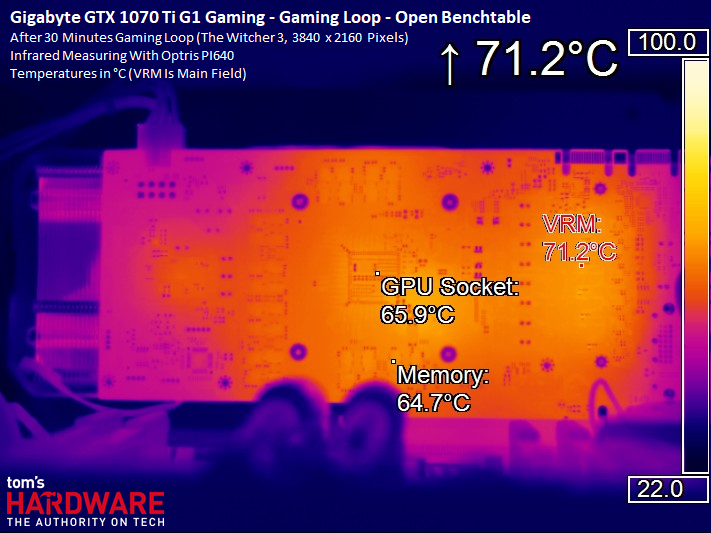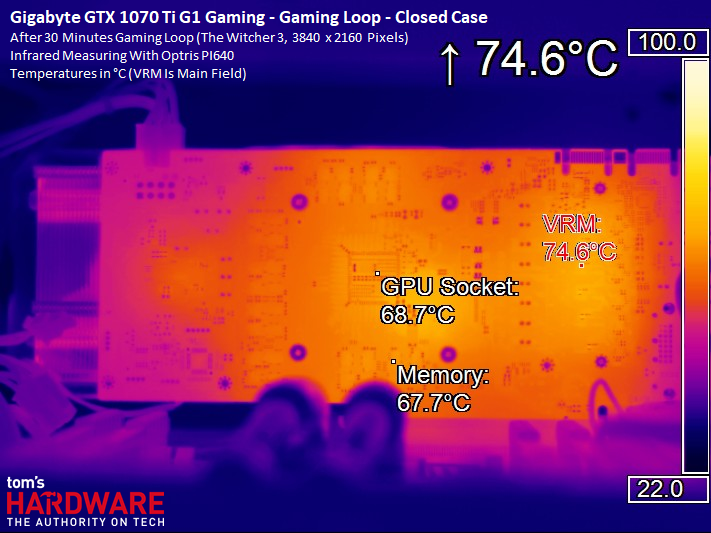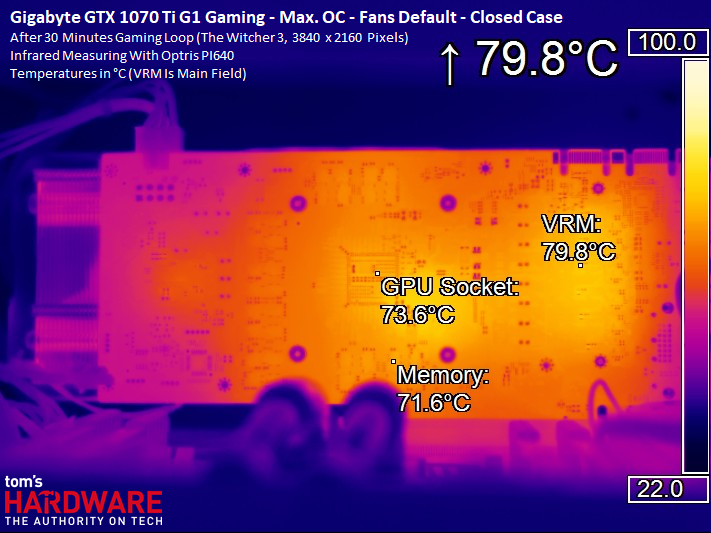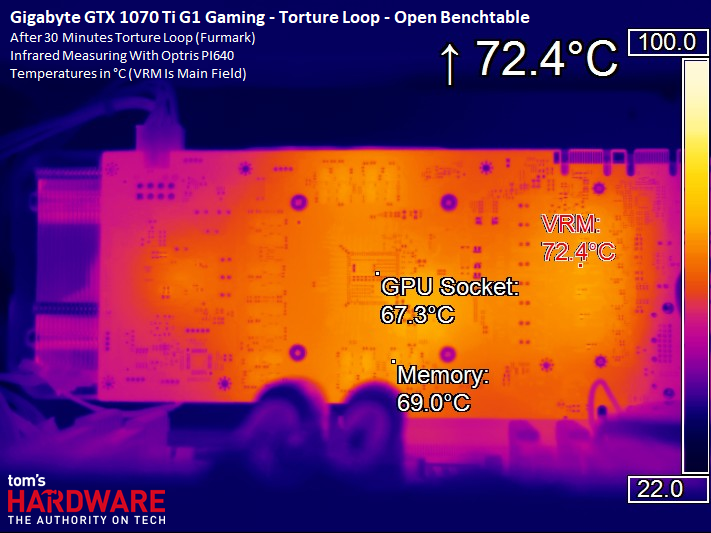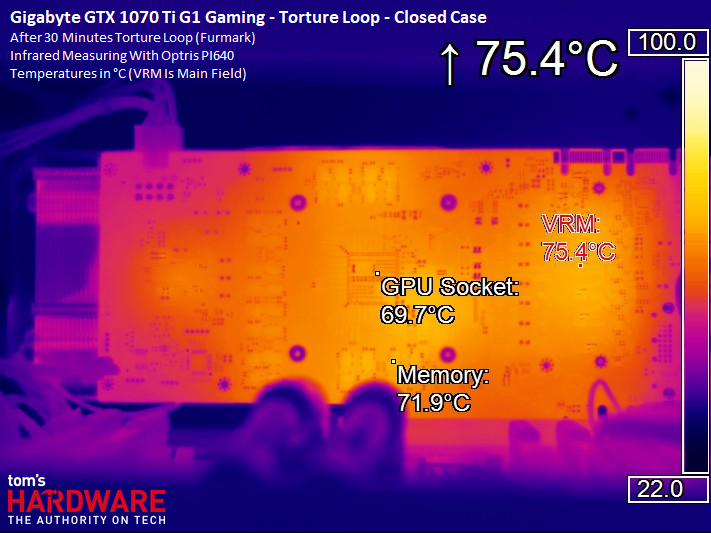Gigabyte GeForce GTX 1070 Ti Gaming 8G Review
Why you can trust Tom's Hardware
Temperatures, Clock Rates & Overclocking
Overclocking
The limits of this card are identical to competing boards with similar power ceilings. At a maxed-out target of 122%, we measured just under 215W. Voltage and (unfortunately) power were the identified limiting factors.
Our sample ran stably with a +200 MHz GPU and +150 MHz memory overclock.
Temperatures & Clock Frequencies
The following table includes starting and end values for our temperature and GPU Boost clock rates.
| Header Cell - Column 0 | Start Value | End Value |
|---|---|---|
| Open Test Bench | ||
| GPU Temperature | 29°C | 67°C |
| GPU Frequency | 1873 MHz | 1784 MHz |
| Ambient Temperature | 22°C | 22°C |
| Closed Case | ||
| GPU Temperature | 30°C | 69°C |
| GPU Frequency | 1873 MHz | 1759 MHz |
| In-Case Temperature | 22°C | 40°C |
| OC (Open Test Bench) | ||
| GPU Temperature (~2530 RPM) | 29°C | 54°C |
| GPU Frequency | 2101 MHz | 2063 MHz |
| Ambient Temperature | 22°C | 22°C |
Temperatures vs. Frequency
Here's a closer look at the data over 15 minutes, during our sample's warm-up phase.
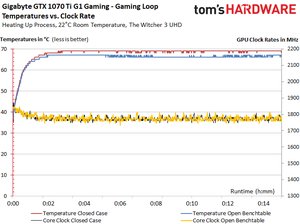
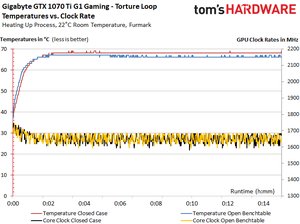
IR Image Analysis Of The Board's Back
The airflow provided by Gigabyte's three-fan thermal solution is sufficient to keep its GeForce GTX 1070 Ti Gaming 8G relatively cool during our gaming loop. Apparently, the company is trying to keep GP104 below 70°C to avoid losing too many GPU Boost steps.
The same observations apply to our tests inside of a closed case, though we do see temperatures roughly three degree higher on average.
With maximum overclocking inside of a closed case, no changes to Gigabyte's fan curve, and a power consumption of ~215W, there's still enough airflow to keep the GPU below 75°C. The voltage converters stay at ~80°C and are thus at no risk of overheating, especially since those temperatures could drop another 3-4° with the backplate in place.
Get Tom's Hardware's best news and in-depth reviews, straight to your inbox.
One measurement that really stands out, though, is the memory's lower-than-normal temperature. At this point, we're seeing the benefit of GeForce GTX 1070 Ti Gaming 8G's altered board layout, with GP104 rotated by 90°. Way to go, Gigabyte!
Even though our stress test shifts the thermal load toward the memory and its voltage regulation circuitry, the readings stay almost as cool as what we saw during the gaming benchmark.
Even in a closed case, temperatures don't increase by more than ~2°C at certain hot-spots. Also, don't forget that the backplate we removed for these infrared tests does improve cooling performance. Those readings should drop a little once we get it back into place.
MORE: Best Graphics Cards
MORE: Desktop GPU Performance Hierarchy Table
MORE: All Graphics Content
Current page: Temperatures, Clock Rates & Overclocking
Prev Page Power Consumption Next Page Cooling & Noise
Igor Wallossek wrote a wide variety of hardware articles for Tom's Hardware, with a strong focus on technical analysis and in-depth reviews. His contributions have spanned a broad spectrum of PC components, including GPUs, CPUs, workstations, and PC builds. His insightful articles provide readers with detailed knowledge to make informed decisions in the ever-evolving tech landscape
-
Cryio I'm still mostly impressed how the Vega64 is universally faster than 1080, same for Vega56 vs 1070.Reply -
derekullo Reply20526514 said:I'm still mostly impressed how the Vega64 is universally faster than 1080, same for Vega56 vs 1070.
The Geforce 1080 beats the Vega64 in Tom Clancy's Ghost Recon Wildlands at 2560x1440.
The Vega64 is also a 295 watt tdp card versus the 180 watt Geforce 1080.
A 60% increase in TDP to be 0 - 12% better is not very efficient.
https://www.techpowerup.com/gpudb/2839/geforce-gtx-1080
https://www.techpowerup.com/gpudb/2871/radeon-rx-vega-64
For completeness, the Geforce 1080 Ti is a 250 watt card.
https://www.techpowerup.com/gpudb/2877/geforce-gtx-1080-ti
On the other hand, Vega56/64 are both awesome monero miners even taking their 295 watt tdp into account.
https://whattomine.com/coins?utf8=%E2%9C%93&adapt_q_280x=0&adapt_q_380=0&adapt_q_fury=0&adapt_q_470=0&adapt_q_480=0&adapt_q_570=0&adapt_q_580=0&adapt_q_vega56=1&adapt_vega56=true&adapt_q_vega64=0&adapt_q_750Ti=0&adapt_q_1050Ti=0&adapt_q_10606=0&adapt_q_1070=0&adapt_q_1080=0&adapt_q_1080Ti=0ð=true&factor%5Beth_hr%5D=36.5&factor%5Beth_p%5D=210.0&grof=true&factor%5Bgro_hr%5D=38.0&factor%5Bgro_p%5D=190.0&x11gf=true&factor%5Bx11g_hr%5D=10.5&factor%5Bx11g_p%5D=230.0&cn=true&factor%5Bcn_hr%5D=1850.0&factor%5Bcn_p%5D=190.0&eq=true&factor%5Beq_hr%5D=440.0&factor%5Beq_p%5D=190.0&lre=true&factor%5Blrev2_hr%5D=13000.0&factor%5Blrev2_p%5D=190.0&ns=true&factor%5Bns_hr%5D=290.0&factor%5Bns_p%5D=160.0&lbry=true&factor%5Blbry_hr%5D=260.0&factor%5Blbry_p%5D=210.0&bk2bf=true&factor%5Bbk2b_hr%5D=1900.0&factor%5Bbk2b_p%5D=230.0&bk14=true&factor%5Bbk14_hr%5D=2600.0&factor%5Bbk14_p%5D=210.0&pas=true&factor%5Bpas_hr%5D=1350.0&factor%5Bpas_p%5D=230.0&skh=true&factor%5Bskh_hr%5D=36.0&factor%5Bskh_p%5D=210.0&factor%5Bl2z_hr%5D=420.0&factor%5Bl2z_p%5D=300.0&factor%5Bcost%5D=0.1&sort=Profitability24&volume=0&revenue=24h&factor%5Bexchanges%5D%5B%5D=&factor%5Bexchanges%5D%5B%5D=abucoins&factor%5Bexchanges%5D%5B%5D=bitfinex&factor%5Bexchanges%5D%5B%5D=bittrex&factor%5Bexchanges%5D%5B%5D=bleutrade&factor%5Bexchanges%5D%5B%5D=cryptopia&factor%5Bexchanges%5D%5B%5D=hitbtc&factor%5Bexchanges%5D%5B%5D=poloniex&factor%5Bexchanges%5D%5B%5D=yobit&dataset=Main&commit=Calculate
-
danielh1949 Stacking 4 Oscopes on top of a high shelf? are you serious? please reconsider, your work is worth reading.Reply -
FormatC Reply
What's the problem? Haven't you ever been in a lab before? The parts can be stacked and this is provided for by the manufacturer. Besides, everything's screwed down, don't worry. I need short signalling pathways to connect the scopes to each other, there are not many possibilities left. And - between you and me: when I'm standing in front of it, the top scope is barely at eye level. This is the art of photography, not a high shelf :D20526949 said:Stacking 4 Oscopes on top of a high shelf? are you serious? please reconsider, your work is worth reading.
If you don't have any problems, you can build your own... ;)
-
danielh1949 Reply
Just concerned about your safety, and I've built enough of my own; but I see from your picture that I need not be concerned. Nice setup, as long as it's safe. I look forward to interesting reading. I'd especially like waveform comparison of the current PCI with the new bus they're considering as the replacement. The whole waveguide multilayer PC board is nearly as interesting as Walsh codes. Merry Christmas and Happy New Year. Hope it's better than this one was. Old Lang Syne is gaining new meaning to me. Dan20529267 said:
What's the problem? Haven't you ever been in a lab before? The parts can be stacked and this is provided for by the manufacturer. Besides, everything's screwed down, don't worry. I need short signalling pathways to connect the scopes to each other, there are not many possibilities left. And - between you and me: when I'm standing in front of it, the top scope is barely at eye level. This is the art of photography, not a high shelf :D20526949 said:Stacking 4 Oscopes on top of a high shelf? are you serious? please reconsider, your work is worth reading.
If you don't have any problems, you can build your own... ;)
-
FormatC Have you ever been to the lab in China? What is the screw for the German and the glue for the American is the cable tie for the Chinese. It's all very optimistic (ok, it looks so), but it's (mostly) holding up well. :DReply
I wish you also a happy new year and have a nice time. :) -
danielh1949 Reply20533302 said:Have you ever been to the lab in China? What is the screw for the German and the glue for the American is the cable tie for the Chinese. It's all very optimistic (ok, it looks so), but it's (mostly) holding up well. :D
I wish you also a happy new year and have a nice time. :)
My uncle, Herr Professor, sent me German Erektor Sets for my earliest birthdays (or so I seem to remember), Your question brought to my mind a vision of an erector set tower held together by wire ties.:pt1cable: I guess it would be good for an earthquake, although I would not like to be on it at that time.
